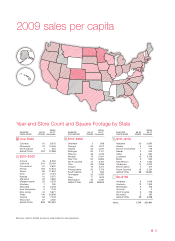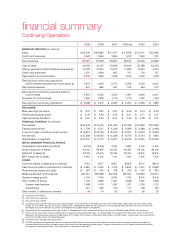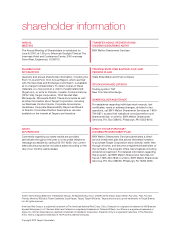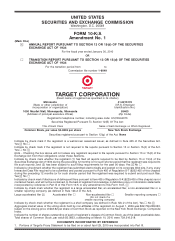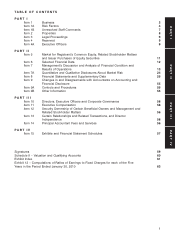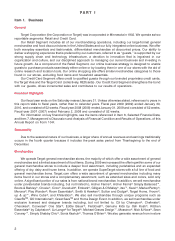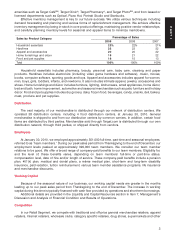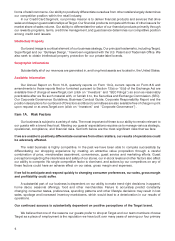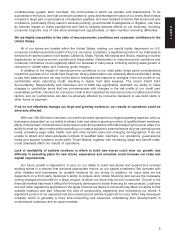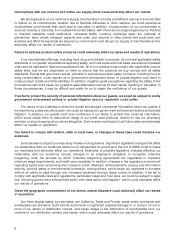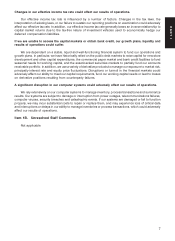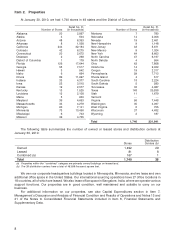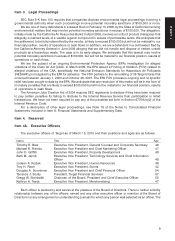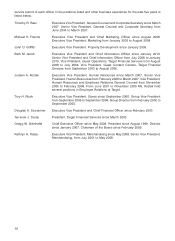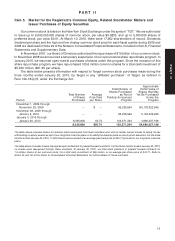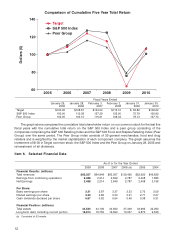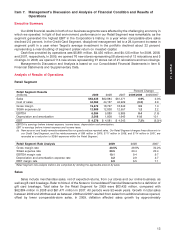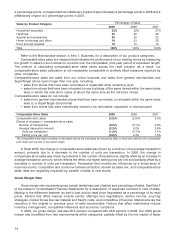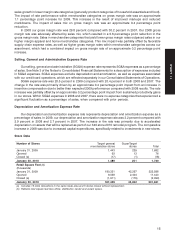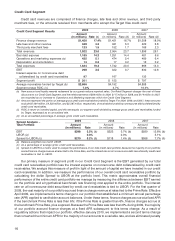Target 2009 Annual Report Download - page 27
Download and view the complete annual report
Please find page 27 of the 2009 Target annual report below. You can navigate through the pages in the report by either clicking on the pages listed below, or by using the keyword search tool below to find specific information within the annual report.Interruptions with our vendors and within our supply chain could adversely affect our results.
We are dependent on our vendors to supply merchandise in a timely and efficient manner. If a vendor fails
to deliver on its commitments, whether due to financial difficulties or other reasons, we could experience
merchandise out-of-stocks that could lead to lost sales. In addition, a large portion of our merchandise is
sourced, directly or indirectly, from outside the United States, with China as our single largest source. Political
or financial instability, trade restrictions, increased tariffs, currency exchange rates, the outbreak of
pandemics, labor unrest, transport capacity and costs, port security or other events that could slow port
activities and affect foreign trade are beyond our control and could disrupt our supply of merchandise and/or
adversely affect our results of operations.
Failure to address product safety concerns could adversely affect our sales and results of operations.
If our merchandise offerings, including food, drug and children’s products, do not meet applicable safety
standards or our guests’ expectations regarding safety, we could experience lost sales, experience increased
costs and be exposed to legal and reputational risk. All of our vendors must comply with applicable product
safety laws, and we are dependent on them to ensure that the products we buy comply with all safety
standards. Events that give rise to actual, potential or perceived product safety concerns, including food or
drug contamination, could expose us to government enforcement action or private litigation and result in
costly product recalls and other liabilities. In addition, negative guest perceptions regarding the safety of the
products we sell could cause our guests to seek alternative sources for their needs, resulting in lost sales. In
those circumstances, it may be difficult and costly for us to regain the confidence of our guests.
If we fail to protect the security of personal information about our guests, we could be subject to costly
government enforcement actions or private litigation and our reputation could suffer.
The nature of our business involves the receipt and storage of personal information about our guests. If
we experience a data security breach, we could be exposed to government enforcement actions and private
litigation. In addition, our guests could lose confidence in our ability to protect their personal information,
which could cause them to discontinue usage of our credit card products, decline to use our pharmacy
services, or stop shopping at our stores altogether. Such events could lead to lost future sales and adversely
affect our results of operations.
Our failure to comply with federal, state or local laws, or changes in these laws could increase our
expenses.
Our business is subject to a wide array of laws and regulations. Significant legislative changes that affect
our relationship with our workforce (which is not represented by unions as of the end of 2009) could increase
our expenses and adversely affect our operations. Examples of possible legislative changes affecting our
relationship with our workforce include changes to an employer’s obligation to recognize collective
bargaining units, the process by which collective bargaining agreements are negotiated or imposed,
minimum wage requirements, and health care mandates. In addition, changes in the regulatory environment
regarding topics such as banking and consumer credit, Medicare reimbursements, privacy and information
security, product safety or environmental protection, among others, could cause our expenses to increase
without an ability to pass through any increased expenses through higher prices. In addition, if we fail to
comply with applicable laws and regulations, particularly wage and hour laws, we could be subject to legal
risk, including government enforcement action and class action civil litigation, which could adversely affect
our results of operations.
Given the geographic concentration of our stores, natural disasters could adversely affect our results
of operations.
Our three largest states, by total sales, are California, Texas and Florida, areas where hurricanes and
earthquakes are prevalent. Such events could result in significant physical damage to or closure of one or
more of our stores or distribution centers, and cause delays in the distribution of merchandise from our
vendors to our distribution centers and stores, which could adversely affect our results of operations.
6


